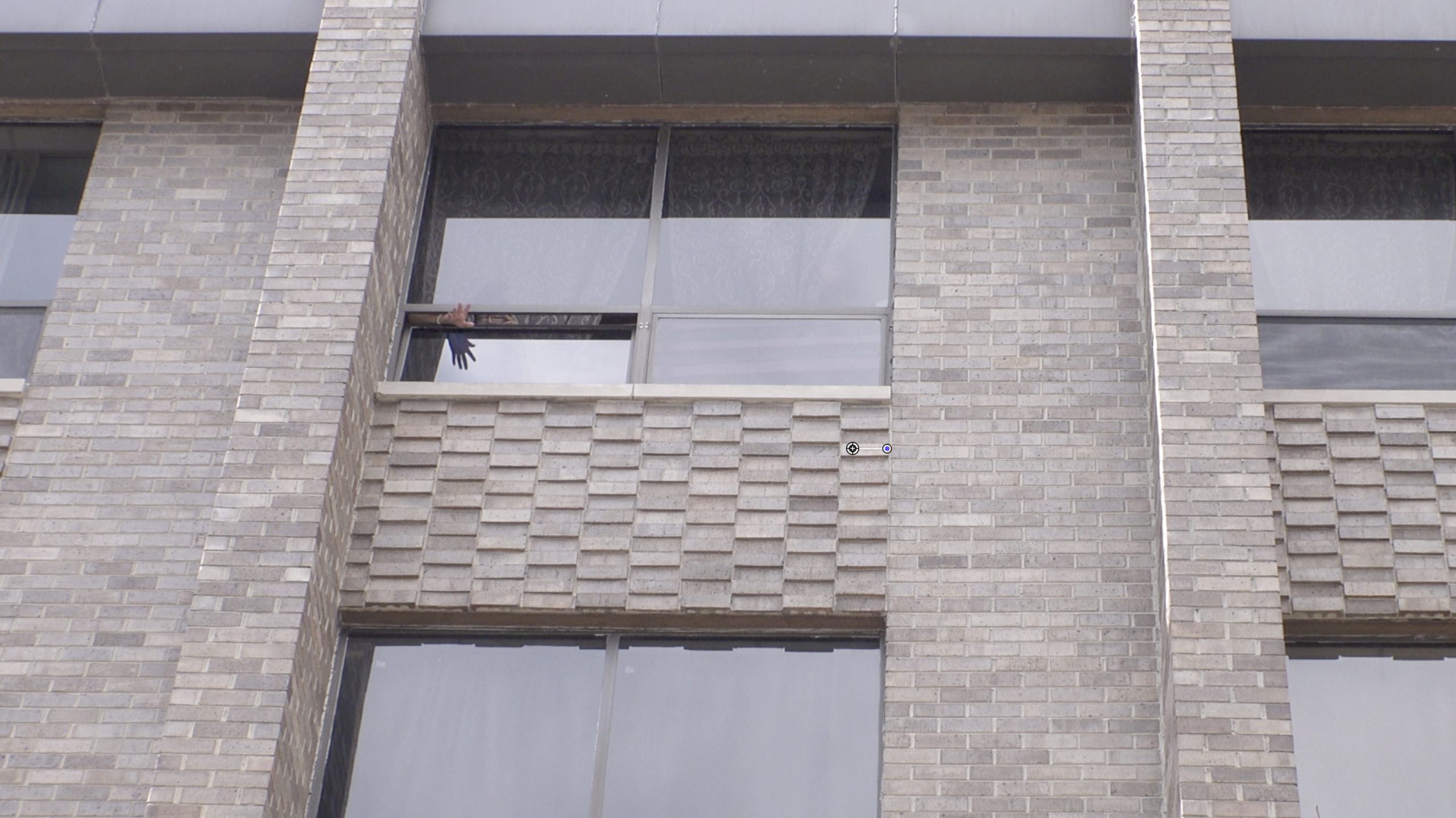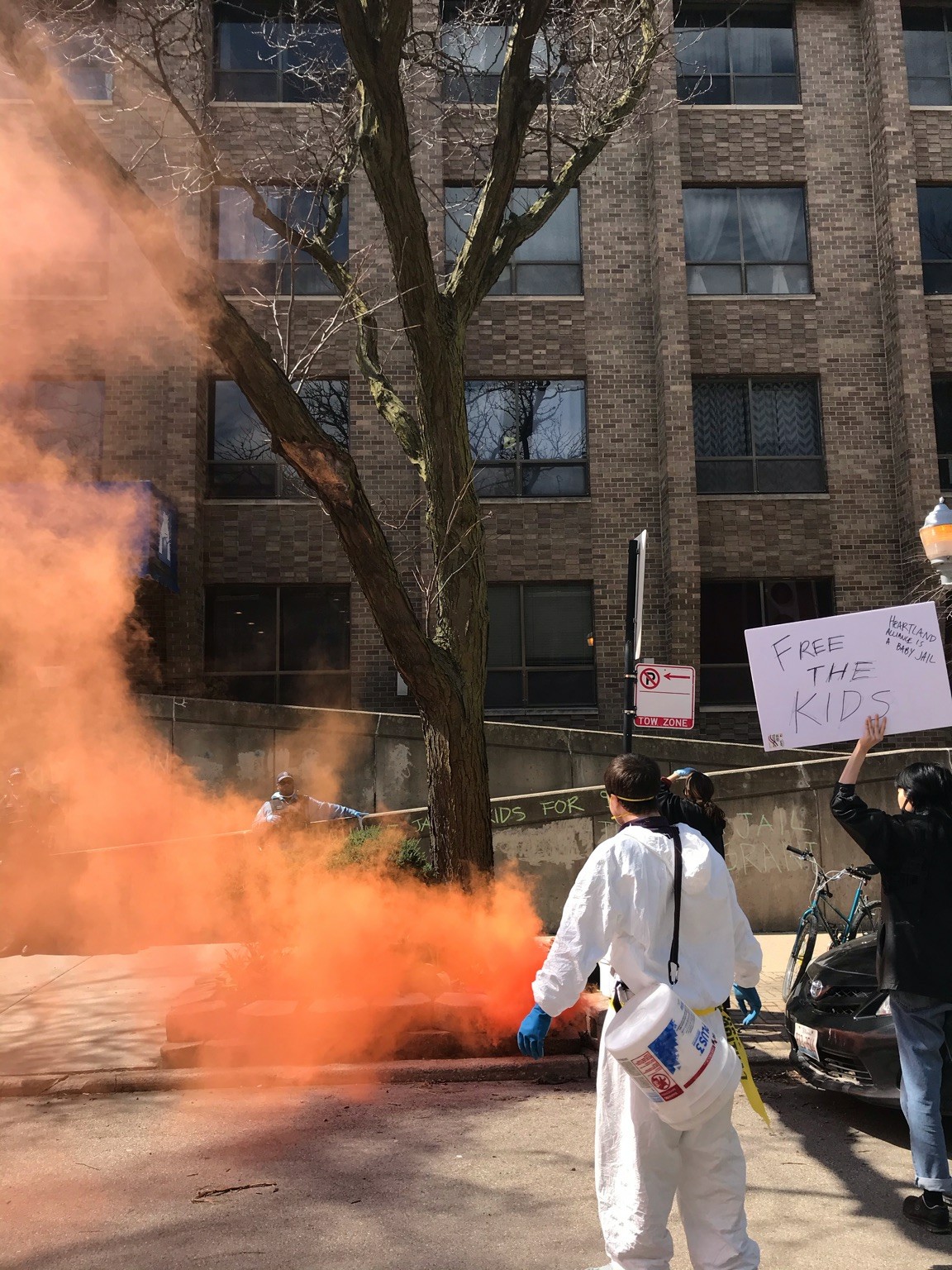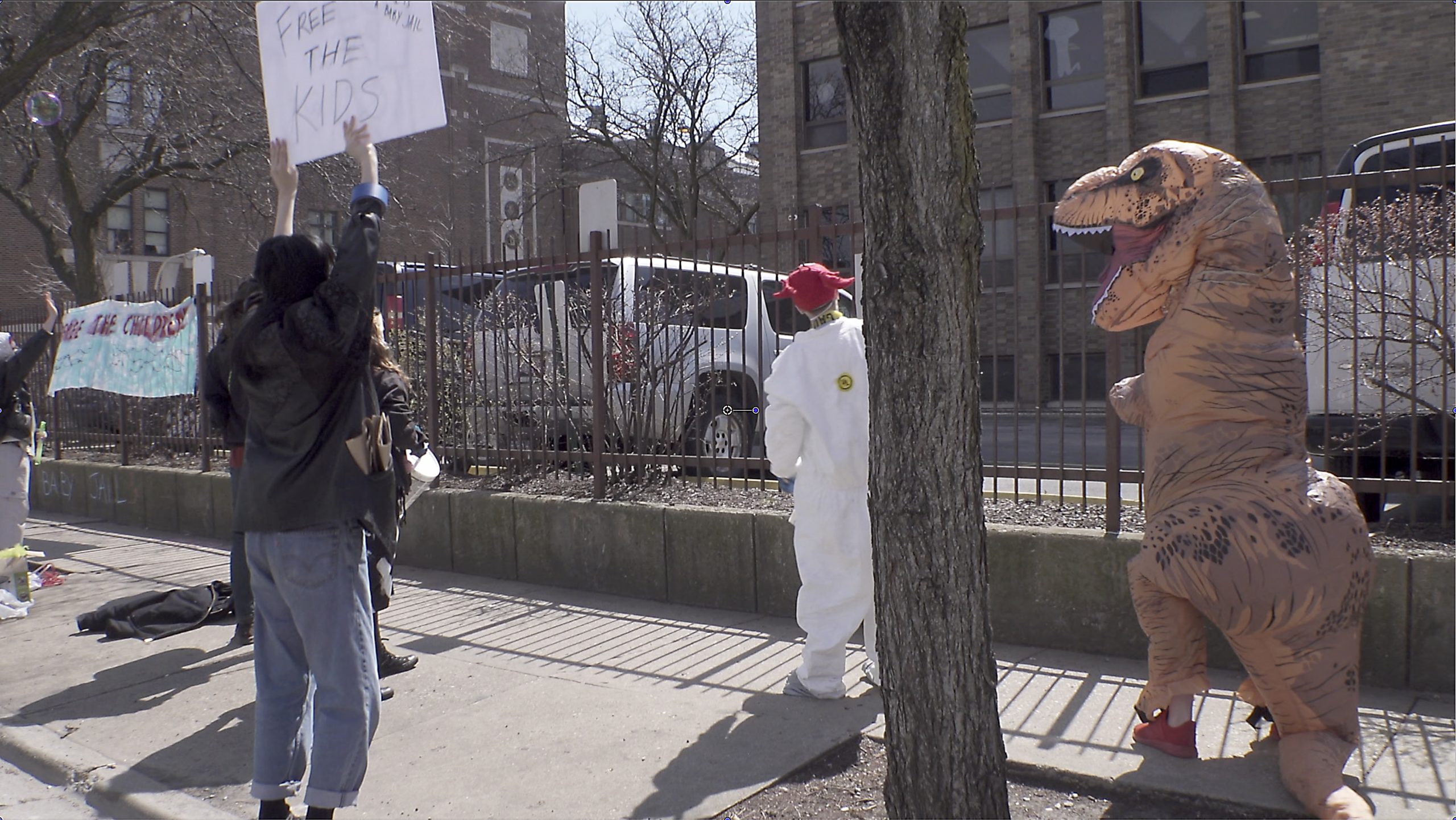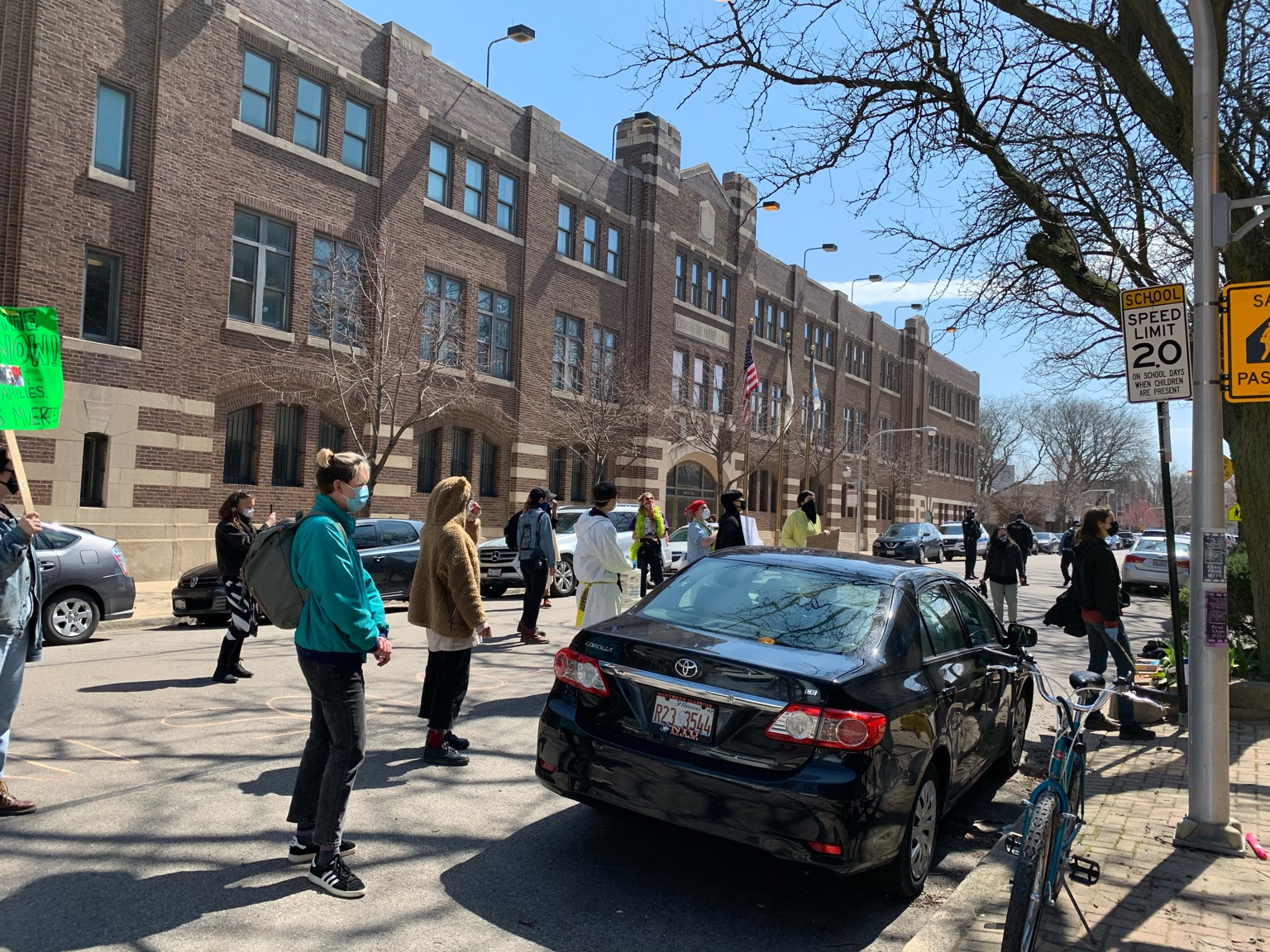Filed under: Action, Immigration, Incarceration, Midwest

The following report details the ongoing struggle to free hundreds of children held within a network of detention facilities located across the city of Chicago as pressure mounts to free them in the face of the coronavirus pandemic.
On April 6th, a solidarity demo was held at a migrant child detention center in Chicago, one of many actions demanding the immediate liberation of the detainees to their families and loved ones. Over 14,000 children continue to be held in lock-ups that specialize in so-called “Unaccompanied Alien Children” (UAC) around the US – and 250 of them are held right here, at 3500 S Giles Ave in Chicago, a detention site operated by Heartland Alliance. Detention is inherently violent. And during a pandemic, the cruelty and hypocrisy of keeping thousands locked-up, while on the outside measures like shelter in place and social distancing are enforced, are unbearable. Children waved and danced at the windows, and some even threw small gifts – a colored paper origami and a shoe.
There is special urgency in this fight right now. A U.S. District Court is considering mass release of children from Immigration and Customs Enforcement (ICE) and Office of Refugee Resettlement (ORR) custody because of the spread of coronavirus. A critical decision is expected after April 10th. But reading the judge’s opinion confirms what we have always known – we cannot rely on the courts to liberate the children to the families, we must push to make that happen ourselves. Even without a court order, ORR and ICE have the discretion to expedite children’s cases – WHILE THE COURTS DELIBERATE IS OUR TIME TO KEEP FIGHTING!
On March 26th, 2020, lawyers representing detained migrant children filed an application with a U.S. District Court claiming that, in light of the coronavirus pandemic, immigration authorities are breaking the law by not releasing most children immediately. The lawyers petitioned the court to force detention facilities to release all the children they can, provide justification for any who are not released, and prove that they are complying with the CDC’s COVID-19 guidelines. On March 28th, District Court Judge Dolly M. Gee issued an initial ruling denying the request to immediately release the children en masse. However, the court did order that (1) by April 6th, ORR and ICE must provide a summary of steps they are taking to release the children; (2) by April 9th, all ORR and ICE facilities must undergo inspection to collect evidence on their health and safety protocols; and (3) by April 10th, ORR and ICE must argue why they should not be compelled to release the children. After April 10th, the District Court will issue a final decision.
Odds do not look good for the court to order an immediate release of all the children. Judge Gee’s opinion states, “the interests of all parties and the public are not well served at this time by rushing to release minors en masse in the midst of the current travel restrictions or to release them to potentially unfit custodians based on limited information.” The District Court appears to be sympathetic to the argument that as many children as possible should be released as quickly as possible. However, if the court does rule in this direction after April 10th, the process will likely be longer, more complicated, and less comprehensive than what we have fought been fighting for.
The Court ruled that ICE was “deficient” in nearly all of the CDC’s pandemic guidelines while “ORR appears to be in substantial compliance” with its “obligations to implement CDC-compliant guidelines.” Judge Gee did not explain how the court found ORR to be compliant while stating that ORR “fails to address recommendations related to social distancing, personal hygiene, or personal protective equipment.” The court also notes that ORR custody qualifies as “congregate care” under CDC guidelines and that congregate care “refers to settings where numerous people sleep, eat, bathe, and participate in daily activities in close quarters and, by definition, is incompatible with social distancing.”
The Court does not reconcile how it can find ORR to be in “substantial compliance” while its facilities are “by definition” incompatible with one of the most important CDC recommendations, social distancing. The court seems confirm what our struggle has always affirmed, and what immigration agencies and the nonprofits that run child detention centers have always denied — that children are being unnecessarily detained and remain in custody for longer than is justifiable even by their own rules. Here is a passage from Judge Gee’s opinion (emphases added):
As of December 31st, 2019, of the 4,562 minors still in custody at that time, nearly half of them had been in custody for less than 20 days, but 11.6 percent had been in custody for 31-60 days and – incredibly – 11.7 percent had been in custody for six months to one year…ORR’s data do not indicate why the agency failed to release these minors or how many of them have sponsors. Although…data from 2018 indicates that the vast majority of children in ORR’s care had close family members available as custodians, neither party has provided more updated information.
Judge Gee also noted that ORR’s “apparent failure” to document its reunification efforts made it difficult to ascertain how many releases were delayed “without good reason,” which would violate the law. Families of migrant children and their allies have argued for years that the majority of detained children have family already in the United States, that they could be reunited with these relatives immediately, and that their detention incarceration is unnecessary and cruel. In our fight we have proven that detaining these children is meant to reap information that benefits immigration enforcement but does not benefit the health and safety of the children. The data presented in the court opinion affirms truths that immigration officials continuously deny.
All so-called “unaccompanied” migrant children are detained automatically in mandatory, mass detention. While detained, the government investigates the children’s family to approve a “sponsor.” The child is then released to the sponsor to await their immigration trial. The information extracted from children and their families during this detention is available to ICE’s deportation machinery. LVSN recently published testimony of a young man named José who was detained in ORR facilities for 322 days because he refused to cooperate with the investigation of his family. He would not provide any information to ORR, well aware of how it could be used, and stayed locked up until he turned 18. He was then transferred to an adult ICE prison and his family payed his bail immediately.
Because of stories like José’s, ORR and ICE will attempt to justify the cases of children who have been in custody for so long. Families and allies of the children can provide many reasons: Muslim kids are generally held longer than all other kids; a small percentage of children have more “complicated” cases involving missing or inconsistent documents; children resist the investigation to protect their families; families are afraid of reprisals and cannot step forward to claim custody.
Communities resisting migrant child detention refuse to be idle while the court debates. Most ORR/ICE facilities have not begun expediting children’s cases and children are trapped in close quarters. Children who are currently detained are also still expected to show up to their immigration court dates in-person. Meanwhile, fewer children are being taken into ICE/ORR custody; cynically the Trump administration has used CDC guidelines to justify the immediate deportation of children who arrive at the border who would have otherwise been placed in these facilities. These immediate deportations likely violate the William Wilberforce Trafficking Victims Protection Reauthorization Act, a 2008 law that reinforced the mass detention of migrant children but also mandated more extensive legal counsel and other protections for children fleeing violence and abuse.
Our fight against ORR, ICE and the nonprofits that run migrant child detention centers continues. Direct action and public pressure are the only ways to achieve what the courts can’t or won’t – freedom for all migrant children!
Link up with and follow the Little Village Solidarity Network here.








